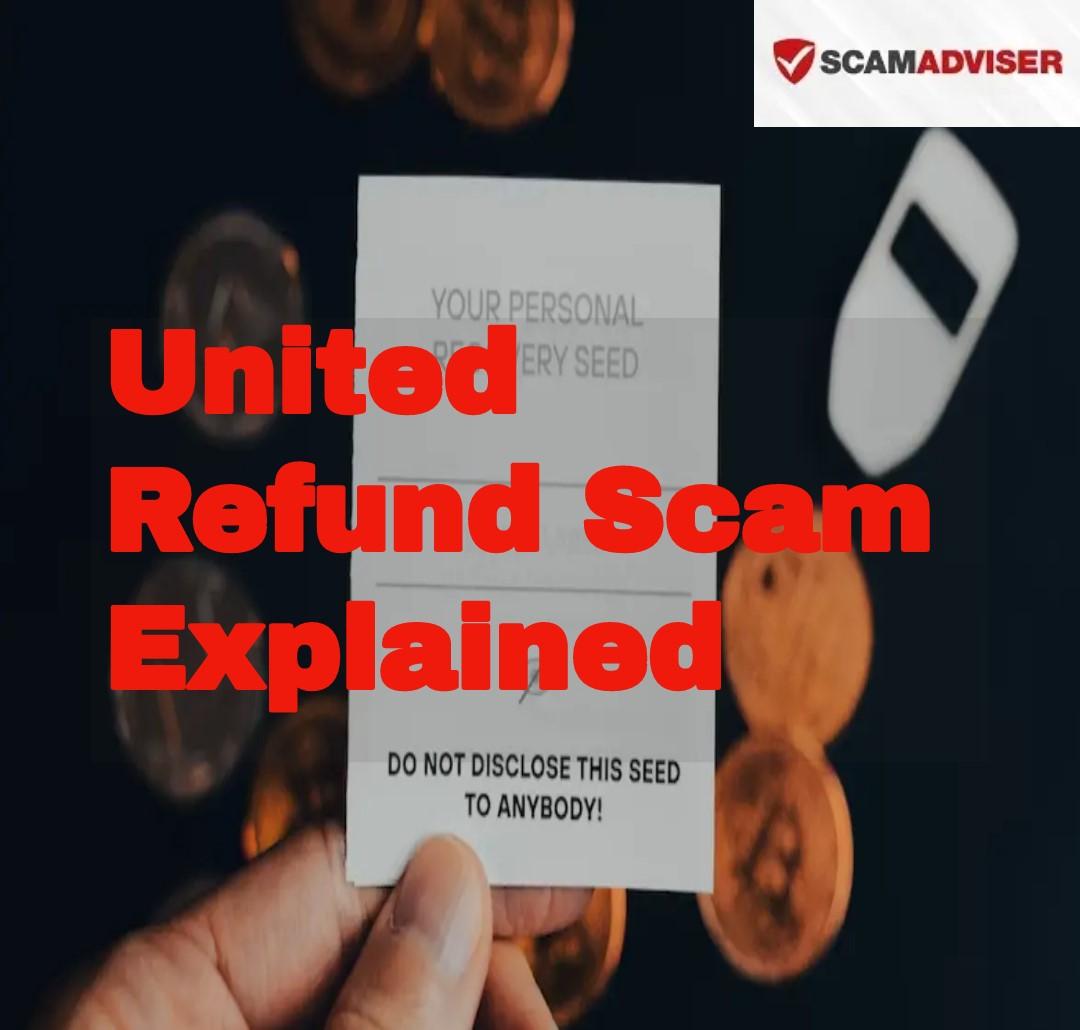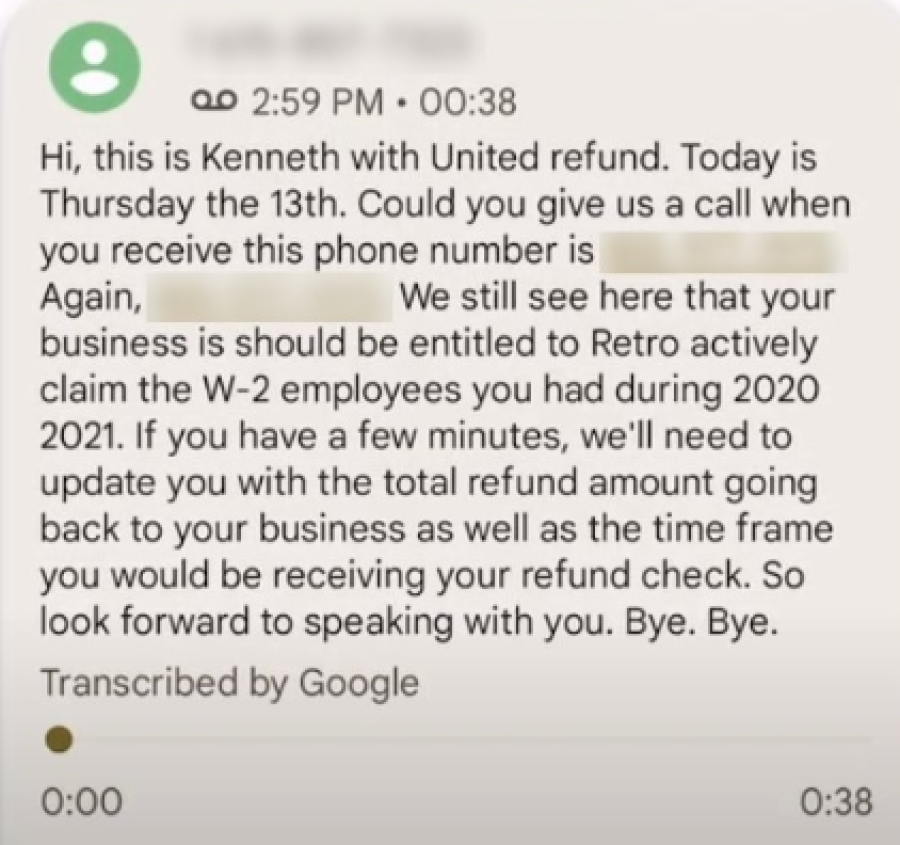United Refund Scam Explained

Author: Trend Micro
Scammers have recently been posing as representatives from a company named United/United Refund. They’ve been attempting to deceive people by stating that they qualify for a W2-related refund and then attempting to manipulate them into disclosing their personal and financial information.
Although it has been reported as so elsewhere online, there is no indication that the scammers are intentionally impersonating United Airlines. It is simply an unfortunate coincidence that the scammers chose a bogus business name similar to that of the airline.
United refund scam call
As reported by ScamAdviser, scammers have been calling people from a number with a caller ID of 855-977-1975, stating they’re from a company called United/United Refund, and informing would-be victims that they’re entitled to claim a W2-related refund.
Below is a screenshot showing a transcription of a voicemail left by one of the perpetrators of this scam that has recently been targeting business owners.

United refund scam. Source: ScamAdviser
The scammers’ goals
Although the scammers appear to be calling from the US, it seems as though they may be based elsewhere, as evidenced by this Tweet:

Report of United refund call scam on Twitter
The scammers may have been attempting to trick that Twitter user into using the legitimate money transfer app, WorldRemit, to transfer money directly into their account — a brazen scam, if nothing else.
However, the scammers likely have an additional goal: to get people to share their personal and financial information, which they perhaps intend to sell to cybercriminals/hackers on the dark web and/or use to commit further crimes themselves.
Be sure to watch out for scam calls such as this one. Also, be aware of the fact that although the scammers spoofed the number 855-977-1975 in many incidents of this scam recently, that’s not to say that they won’t switch to using a different phone number, or even a different fake company name. As always, be vigilant.
How did the scammers get my phone number?
If you’ve received a similar call or voicemail and you’re wondering how the scammers were even able to get your phone number in the first place, you’re not alone. They will often get people’s personal info from underground internet forums or the dark web — two places that are hotbeds for stolen/leaked data.
If you want to find out if your phone number has been leaked, be sure to check out ID Protection. Also, make sure to explore all its other features because it’s packed with lots of them, including Personal Identity Monitoring and Social Media Account Monitoring. If you care about protecting your identity and online privacy, you’ll definitely want to click the button below.
If you’ve found this article an interesting and/or helpful read, please SHARE it with friends and family to help keep the online community secure and protected. Also, please consider clicking the LIKE button below.
This article was published in collaboration with Trend Micro.
Image source: unsplash.com
Report a Scam!

Have you fallen for a hoax, bought a fake product? Report the site and warn others!
Scam Categories
Help & Info
Popular Stories
As the influence of the internet rises, so does the prevalence of online scams. There are fraudsters making all kinds of claims to trap victims online - from fake investment opportunities to online stores - and the internet allows them to operate from any part of the world with anonymity. The ability to spot online scams is an important skill to have as the virtual world is increasingly becoming a part of every facet of our lives. The below tips will help you identify the signs which can indicate that a website could be a scam. Common Sense: Too Good To Be True When looking for goods online, a great deal can be very enticing. A Gucci bag or a new iPhone for half the price? Who wouldn’t want to grab such a deal? Scammers know this too and try to take advantage of the fact. If an online deal looks too good to be true, think twice and double-check things. The easiest way to do this is to simply check out the same product at competing websites (that you trust). If the difference in prices is huge, it might be better to double-check the rest of the website. Check Out the Social Media Links Social media is a core part of ecommerce businesses these days and consumers often expect online shops to have a social media presence. Scammers know this and often insert logos of social media sites on their websites. Scratching beneath the surface often reveals this fu
So the worst has come to pass - you realise you parted with your money too fast, and the site you used was a scam - what now? Well first of all, don’t despair!! If you think you have been scammed, the first port of call when having an issue is to simply ask for a refund. This is the first and easiest step to determine whether you are dealing with a genuine company or scammers. Sadly, getting your money back from a scammer is not as simple as just asking. If you are indeed dealing with scammers, the procedure (and chance) of getting your money back varies depending on the payment method you used. PayPal Debit card/Credit card Bank transfer Wire transfer Google Pay Bitcoin PayPal If you used PayPal, you have a strong chance of getting your money back if you were scammed. On their website, you can file a dispute within 180 calendar days of your purchase. Conditions to file a dispute: The simplest situation is that you ordered from an online store and it has not arrived. In this case this is what PayPal states: "If your order never shows up and the seller can't provide proof of shipment or delivery, you'll get a full refund. It's that simple." The scammer has sent you a completely different item. For example, you ordered a PlayStation 4, but instead received only a Playstation controller. The condition of the item was misrepresented on the product page. This could be the